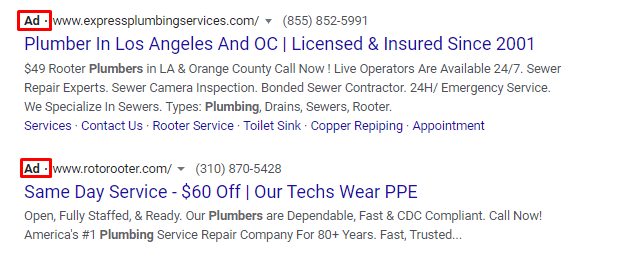-
 9 min. read
9 min. read
-
 Macy Storm
Macy Storm Senior Content Creator
Senior Content Creator
- Macy is a marketing writer with over five years of experience creating content for dozens of industries including food and beverage, home services, and education. She also specializes in creating SEO and PPC content. Her work has been featured by Search Engine Journal, HubSpot, Entrepreneur, Clutch, and more. In her free time, Macy enjoys trying new crafts and reading comic books.
Digital marketing. Internet marketing. Online marketing.
These terms are used interchangeably, but do they mean the same thing? We’re here to tell you that, in the digital marketing vs. Internet marketing debate, these two terms are slightly different. And we’ll tell you how! Keep reading to learn the difference between Internet marketing and digital marketing, and if you’re interested in consistently learning more about digital marketing, don’t forget to sign up for Revenue Weekly!
Digital marketing vs. Internet marketing: The definitions
Digital marketing and Internet marketing are remarkably similar, but they do differ slightly. Let’s look at the definition of these two terms.
Digital marketing
Digital marketing is a broad term that describes a set of marketing strategies that use digital channels to promote your products or services. This term is an umbrella term that describes anything that uses a digital platform for marketing your business, from social media platforms to TV ads.
Digital marketing ads aren’t limited to the web.
Internet marketing
Internet marketing, also known as online marketing, is a subset of digital marketing that includes strategies you use to market yourself online. To qualify as an Internet marketing strategy, it must require the Internet to work and connect with leads. Internet marketing focuses on building a presence on the web.
Digital marketing vs. Internet marketing: what’s the difference?
As you can see by the above definitions for explaining digital marketing and Internet marketing, the difference between these two is slight. Digital marketing doesn’t require Internet strategies to fall under this category, while Internet marketing requires using the Internet to market to your audience. Digital marketing is an umbrella term under which Internet marketing falls.
Internet marketing is a more precise form of digital marketing.
Digital marketing vs. Internet marketing: The channels
Since Internet marketing is a subset of digital marketing, many channels overlap. Additionally, many strategies are solely digital marketing and not Internet marketing. Here’s where some of these strategies fall:
Search engine optimization (SEO)
| Strategy | Digital Marketing | Internet Marketing |
| Search engine optimization (SEO) | yes | yes |
| Pay-per-click advertising | yes | yes |
| Email marketing | yes | yes |
| Social media marketing | yes | yes |
| Content marketing | yes | yes |
| Social media advertising | yes | yes |
| Web design | yes | yes |
| TV ads | yes | no |
| Digital billboards | yes | no |
| Radio spots | yes | no |
| SMS texts | yes | no |
As you can see, many of these strategies fall under both Internet marketing and digital marketing.
The only strategies that don’t fall under Internet marketing are strategies that don’t require the Internet to advertising to prospects.
Digital marketing vs. Internet marketing: Finding overlapping strategies
Instead of focusing on digital marketing vs. online marketing or Internet marketing, it’s time to focus on Internet marketing and digital marketing. Let’s look at four strategies you can use.
1. Search engine optimization (SEO)
When you look at digital marketing vs. online marketing, you’ll find that search engine optimization (SEO) is a strategy that falls under both categories. SEO is a strategy that focuses on boosting your rankings in the search results to help you drive more relevant traffic to your page. With so many people conducting searches every day (the average person conducts 3-4 searches per day), it’s critical to invest in SEO to help you reach more qualified leads.
Here are some key components of creating an effective SEO strategy:
- Integrating relevant key terms: Keywords trigger your site to appear in search results. If you want to reach people looking for your business, you must choose the right, industry-specific terms to drive traffic. As a rule of thumb, you’ll want to stick to long-tail keywords, which contain three or more words, to ensure you’re driving traffic interested in your business.
- Improve your site’s load time: Users want information fast, and search engines want to deliver it to them quickly. To improve your site’s load time, check Google PageSpeed Insights to see how quickly your site loads and where you can improve it. You can also invest in page speed services to have an expert optimize your site for you.
- Make your site mobile-friendly: Since Google moved towards mobile-first indexing, which takes your mobile site into account with your rankings, you need to ensure your site is mobile-friendly. Use Google’s Mobile-Friendly Test to figure out if your site is mobile-friendly. If not, you can utilize responsive design to help you create a mobile-friendly site.

2. Pay-per-click (PPC) advertising
Another Internet marketing and digital marketing strategy is pay-per-click (PPC) advertising. PPC ads appear at the top of the search results and have a tag with the word “ad.”

PPC ads will help you drive more qualified leads that convert. With paid visitors being 50% more likely to convert than an organic visitor, it’s a great strategy for helping you grow.
Here are a few key components to running a successful PPC campaign:
- Choose relevant keywords: Like SEO, your keywords determine where your ad appears in search results. You’ll want to optimize for long-tail keywords here, too, because they keep your cost per click (CPC) low and help you attract more qualified leads.
- Customize your landing page: A custom landing page will help you drive better results with your PPC ad. You want to ensure that your landing page matches the content in your ad copy to keep leads engaged with your ad. So, if your ad copy focuses on summer dresses, your landing page should only focus on summer dresses.
- Use ad extensions: Ad extensions will take your ad to the next level. From structured snippets to local extensions, these components can help you add some more information to your ad that entices your audience to click.

3. Content marketing
When you look at digital marketing vs. Internet marketing, you’ll find that content marketing is another strategy that both share. Content marketing is the process of sharing your knowledge with your audience to drive them to your site. Content comes in numerous formats, including:
- Blogs
- Videos
- Infographics
- Podcasts
- Guides
- And more
Content is great for Internet marketing and digital marketing strategies because it enables you to build yourself as an authority in your field, drive traffic to your page, and increase brand recognition. Here are some crucial components to creating a content strategy:
- Utilize a content calendar: Content requires constant creation and publication, so it’s easy to get lost or confused in the process. By utilizing a content calendar, you can help your company stay organized and know when you’re publishing content.
- Try different formats: You’ll want to keep up with your blog regularly, but it’s also important that you utilize other content methods too. From videos to infographics, you’ll want to try different content formats to keep your content fresh and interesting. It helps you appeal to more people in your target audience, like people who don’t like reading blogs but love watching videos.
- Focus on industry topics: While it can be tempting to jump on the trending topics train, unless it’s related to your industry, you’ll want to avoid it. Non-industry related topics may drive traffic, but they won’t drive relevant traffic that’s interested in your business. Focusing on industry topics will help you draw in the right crowd.
4. Email marketing
Another great Internet marketing and digital marketing strategy is email marketing. Email marketing enables you to send content directly to interested leads. From promotional emails to links to blogs, you can send a variety of content to your audience.
This strategy is critical for nurturing leads towards conversion. It’s one of the few methods that enable you to have a direct connection with your audience and deliver the content that interests them. If you want to see success with email marketing, follow these best practices:
- Personalize your email campaigns: Personalized email campaigns will help you drive success with this strategy. Personalized email campaigns go beyond just including a user’s name in the email — you should tailor emails to users’ interests to increase the likelihood they’ll engage with your content. After all, personalization improves the open rate by 41.8%!
- Avoid paying for subscribers: While it may feel like an easy way to get a list of email recipients, paying for subscriber lists is not an effective way to do so. Many people on this list won’t be interested in your business, and as a result, your emails will end up as spam, or users will block you. Instead, rely on obtaining emails through organic means like a form on your website.
- Create a click-worthy subject line: Half of the battle is getting subscribers to open your email. If you want to have a successful email marketing, you need to create an enticing subject line that gets subscribers to open the email. You can try tactics like using emojis, adding a subscriber’s name, and more.
Digital marketing vs. Internet marketing: Creating your cohesive strategy
As you can see, there isn’t much difference between Internet marketing and digital marketing. If you want to have an online marketing strategy, you can create a digital marketing or internet marketing strategy. If you’re ready to dive in and build your online presence, WebFX can help.
We have a team of over 500 marketing experts that are eager to help you grow your business. Give us a call today at 888-601-5359 (or contact us online) to learn about our digital marketing services!
-
 Macy is a marketing writer with over five years of experience creating content for dozens of industries including food and beverage, home services, and education. She also specializes in creating SEO and PPC content. Her work has been featured by Search Engine Journal, HubSpot, Entrepreneur, Clutch, and more. In her free time, Macy enjoys trying new crafts and reading comic books.
Macy is a marketing writer with over five years of experience creating content for dozens of industries including food and beverage, home services, and education. She also specializes in creating SEO and PPC content. Her work has been featured by Search Engine Journal, HubSpot, Entrepreneur, Clutch, and more. In her free time, Macy enjoys trying new crafts and reading comic books. -

WebFX is a full-service marketing agency with 1,100+ client reviews and a 4.9-star rating on Clutch! Find out how our expert team and revenue-accelerating tech can drive results for you! Learn more
Try our free Marketing Calculator
Craft a tailored online marketing strategy! Utilize our free Internet marketing calculator for a custom plan based on your location, reach, timeframe, and budget.
Plan Your Marketing Budget
Table of Contents
- Digital Marketing vs. Internet Marketing: the Definitions
- Digital Marketing vs. Internet Marketing: What’s the Difference?
- Digital Marketing vs. Internet Marketing: the Channels
- Digital Marketing vs. Internet Marketing: Finding Overlapping Strategies
- Digital Marketing vs. Internet Marketing: Creating Your Cohesive Strategy

Maximize Your Marketing ROI
Claim your free eBook packed with proven strategies to boost your marketing efforts.
Get the GuideTry our free Marketing Calculator
Craft a tailored online marketing strategy! Utilize our free Internet marketing calculator for a custom plan based on your location, reach, timeframe, and budget.
Plan Your Marketing Budget




